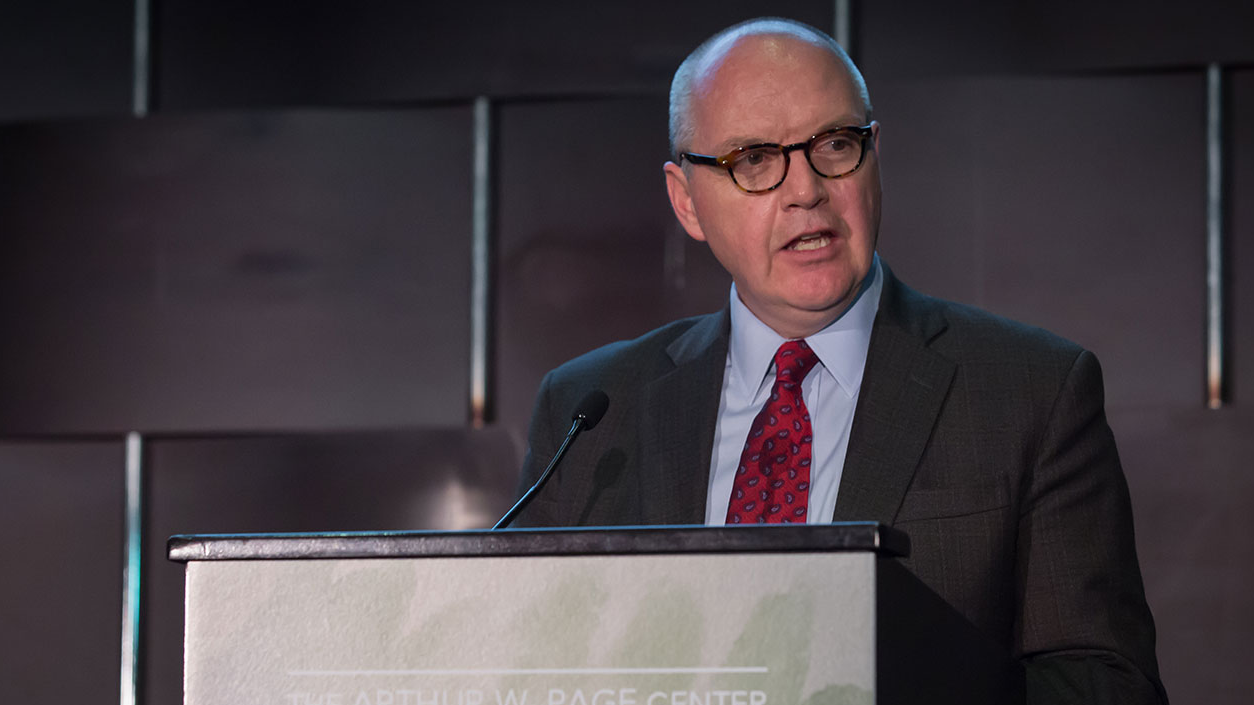Q&A with Center board member Gary Sheffer
December 9, 2022

By Cerrena Lewis, Page Center Intern
Page Center board member Gary Sheffer is the Sandra A. Frazier professor of public relations at Boston University. As a professor, he teaches his students to compare the actions of enterprises to their mission or values. Prior to BU, Sheffer spent 13 years as the chief communications officer at General Electric. He was also a senior corporate strategist at Weber Shandwick. Sheffer has more than 30 years of experience in public relations with expertise in corporate strategy. Sheffer also served as chairman of the Page Society and is a founder/board member of the GE-Reagan Scholarship Program. I chatted with Sheffer about his work in the communications industry, his current career in academics, and his podcast, " The Crux of the Story."
What interested you about working in communications? What qualities do you credit for your success?
What got me started in communications was my love for language. I grew up in a time when journalism was held in high regard. Seeing this as a teenager made me realize that I wanted to be someone who communicated ideas clearly to others. I started my career as a journalist. If I’ve had any success, it’s because I have come to understand how to communicate with people based on their needs in my subsequent jobs and the classroom.
Why do you think integrity in public relations and communications are important?
In many ways, the communicator is the one with the broadest of views in the enterprise. It’s our responsibility to speak the truth, understand all internal and external influences and try to put it together as a truthful representation of the role that our enterprise plays in the world. It is our job to make sure that the enterprise acts and communicates ethically. The way I see it there is a responsibility to be the conscience of the organization.
Why do you think it’s important to be involved with the Page Center?
The Page Center puts a spotlight on the need for integrity in public communications while emphasizing the need for an ethical grounding in everything we do. I love that we put on an event that honors people who represent role models in ethics and communication. It is great that students, practitioners, and researchers can hear from these people. My favorite part is doing the annual reviews of the Center’s research. The research is clear on the benefits that ethical communications brings to an organization.
What role does integrity have at the corporate level versus the individual level?
Individually, we all have a moral center through which we make decisions. A part of our job is to push for a collective understanding of what you mean by integrity and ethics in an organization. The job of the communicator is often working with colleagues to get a consensus amongst a broad group of people about what they value.
Has communicating with integrity affected your overall career? If so, how?
I hope that integrity has been a catalyst for any success that I've had. I try to make clear what my standards are to the teams that I have led. I make my ethics and integrity viewpoints clear to the people I work for. For someone in my position I knew my bosses wanted someone who was going to be the company's conscience. A well-grounded person with good judgement is what CEOs are looking for in the communications role.
What was your experience like at GE? Did integrity and ethics come up a lot in GE’s strategies? If so, how?
When you work for such a large company, someone is bound to make a mistake. I spent plenty of time with the legal team on building an “open reporting environment” where people can feel comfortable reporting things that they saw were unethical. One of the things that was successful was to communicate our mistakes. When people did something wrong, we highlighted it instead of hiding it. We broke down how things went wrong so that others learn from it.
What are you teaching your students about PR and ethics? How do students respond to ethical dilemmas?
I teach crisis management and business acumen for communications. I try to get my students to compare actions of a company to their stated own values. The cases that we see in the news about company mistakes are rich with examples of when ethics and integrity get pushed aside for other priorities. My students are interested in having discussions on issues they care about such as diversity, climate, or economic equity. They want to know if they’re ethical people in the business and PR worlds and I always reassure them that there are.
What advice do you have for young professionals?
I always tell students to never compromise their integrity. If a company asks you to do that consistently, find another job. It’s not worth it to work for a company that does not align with your values.
Why did you decide to make a podcast about the PR world? Is there a guest you particularly enjoy having on the podcast? If so, why?
I enjoy what I do so why not talk about it? What I really try to get at with the podcast is what is the role of business in society and what is the role of communicator(s) in social issues. One guest that I found interesting was Fernando Vivanco, the VP of communications at Maxar, a satellite company that uses its commercial satellites to fight disinformation. I thought it was a fascinating discussion on how business can act in a socially responsible way.

